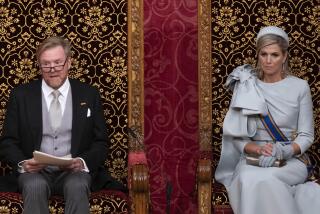POLITICS : De Klerk, Guarding Hand, Plays Negotiations Game : South Africa: The constitutional talks are aimed at giving blacks power while protecting whites. The president proposes a ‘transitional government’ but declines to be specific.
- Share via
CAPE TOWN, South Africa — With the 1992 Parliament now up and running, the question everyone is asking here is: What does President Frederik W. de Klerk plan to put on the negotiating table? And that’s just how the president likes it.
“This is like a bridge game,” De Klerk told reporters this week. “I’ve played one card, and it’s a good card. But I’m not about to show you my hand.”
With the high stakes involved, one reporter asked, isn’t it more like a poker game?
“No,” De Klerk answered without hesitation. “Poker involves too much luck. This is a game of skill.”
Whether a game of chance or skill, the negotiation process is emerging as a complex exercise aimed at solving South Africa’s biggest problem--how to give the black majority a full say in government while protecting whites from being completely dominated.
The political debate, dormant since mid-December, was restarted this week with the opening of Parliament in Cape Town and the beginning of closed-door negotiations in Johannesburg.
Parliament’s white, Colored (mixed-race) and Indian houses have been relegated to the role of spectators these days. And the real business of deciding the future of the country is taking shape at the Convention for a Democratic South Africa, in Johannesburg.
That negotiating process involves 19 political groups, including all the parties in Parliament except the right-wing Conservatives. But the only players who really matter are the government and Nelson Mandela’s African National Congress, the country’s largest black opposition group. Each wields an effective veto because no convention decision can work without their joint support.
In recent days, the government and the ANC have shown clear signs of moving closer together on some of the key issues.
The ANC appeared to modify its support for a strong central government in a new South Africa. ANC Secretary General Cyril Ramaphosa said the ANC now believes that strong regional governments are necessary.
The change of heart apparently stems from concern among leaders of the black homelands that they will lose much of their autonomy if the central government has too much power.
Putting significant power in the hands of regional governments is one way the government hopes to disperse political power and protect whites from being dictated to by the black majority.
De Klerk also appears to have made some concessions. The government originally wanted the convention to draw up a new constitution, which would then be put to the voters. The ANC opposed that, arguing that only a democratically elected body could write a constitution.
Now, though, De Klerk is offering what he believes is a compromise that would bring blacks quickly into government. Under his plan, the negotiating convention would draw up amendments to dissolve the current Parliament and create a “transitional” constitution and government.
The amendments would be put to separate white, black, Indian and Colored referendums, and then to Parliament. If the amendments are approved, new elections would be held.
The catch is that De Klerk sees this “transitional government” as having a life span of five or 10 years, much longer than that envisioned by the ANC. During that time, the new, democratically elected Parliament could write a more permanent constitution.
De Klerk refuses to be specific about his new proposal. However, government sources say the “transitional government” would resemble their earlier constitutional blueprint calling for a two-chamber Parliament similar to that in the United States and a rotating chief executive.
Zach de Beer, leader of the liberal white Democratic Party and a key figure in the negotiating convention, said he is bewildered by De Klerk’s latest proposals. “We are not in principle opposed” to them, De Beer said. “It just sounds mad in relation to everything that has gone before.”
The ANC, still studying De Klerk’s proposal, says it will oppose any attempt to hold racially segregated referendums.
Still, there is room for compromise.
De Klerk says he is honor-bound to hold a white referendum to approve any decisions made by the convention, and he has vowed to go ahead with that referendum--with or without the ANC’s support.
But political analysts note that De Klerk’s white referendum, if approved, could be followed by a nationwide referendum, which would meet the ANC’s demands.
More to Read
Sign up for Essential California
The most important California stories and recommendations in your inbox every morning.
You may occasionally receive promotional content from the Los Angeles Times.














